Beyond Imagination
Success by sheer determination and courage :

|
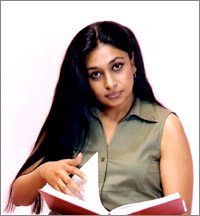
Enokaa Sathyangani Keerthinanda - film maker of international
repute.
|
In a world dominated by men and hostile to women, Enokaa's career in
the highly competitive field of cinema and tele-drama was always an
uphill task. From scratch, she was aware of the fact that one slippery
step in her career as a young woman would have disastrous consequences.
Therefore, her every step was both cautious and steady that led her
to the heights she achieved in the arena of Sri Lankan cinema and fine
arts as the second professional woman movie maker thirty years after
Sumithra Peiris entered Sinhala cinema as a woman director.
Enokaa's liberal upbringing in a household where democracy prevailed,
would have shaped her adult character to be a fiercely independent and
liberal and also a disciplined one.
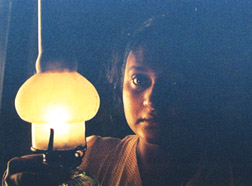
Sulang Kirilli, A liberated woman’s dowry for the humanity:
Aesthetic quality incomparable. |
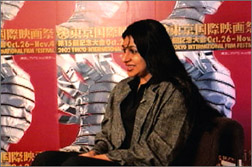
At the exclusive interview with NHK |
Her parents were drawn to diverse fields; father being a lawyer and
mother, a teacher. From her formative days, she dreamt of becoming a
film director and watched films with keen interest. It was that interest
which would have tempted her father to present her a video player on her
birthday.
The artistic legacy of her father, Tudor Kirthinanda who was an avid
listener of classical music; his favourites being Prof. Ediriweera
Sarachandra's 'Maname' and maestro Premasiri Khemadasa's 'Goluhadawathin
Thunveni Yamayata', would have had a lasting impact on Enokaa's artistic
life and her informed choice of music.
In fact, Khemadasa being her father's friend, used to spend time at
Enokaa's and for a moment the house became a forum of intellectual
discussions, appreciating and criticizing the art and culture.
Much of her pocket money was spent on video and audio cassettes and
even during her school days at Sujatha College, she engaged in arts and
culture and used to produce dramas.
After sitting for the Advanced Level examination from Vishakha
Vidyalaya, Enokaa Sathyangani entered the Faculty of Law at the
University of Colombo to read a LLB.
However, her abide interest in the art and culture, particularly; in
cinema did not die down inspite of her heavy dose of studying law. While
at the university, she stumbled upon an advertisement posted in a
newspaper by Telecine for a Trainee Director. So she applied and was
selected among forty candidates who posed for the interview.
This would have proved to be extremely profitable year as she got the
rare opportunity of working with pioneers in the field of advertising D.
B. Nihalsinghe and D. B. Suranimala. As a young woman, Enokaa still
recalled how she was offered the prospect of directing a tele-drama for
Teleview.
She was given a limited period of time (interval between producing
tele-dramas by Teleview) and a limited set at Teleview tele-drama
village. It was a litmus test for her talents to write a script for a
tele-drama to be produced at the village with a set of wattle and daub
houses stretched over a land mass of half an acre.
'Nidinethi Rayaka Sihinayak', a story woven around four characters
was shot and which was later telecast on Rupavahini on March 8, 1997.
Then on ward, she was flooded with tele-dramas, commencing her first
tele-series offered by Teleview.
She was adjudged the best director thrice at the Sumathi and OCIC
tele-drama festivals and subsequently won highest number of
International Awards among the Sri Lankan movie makers at International
Film festivals.
By then though she had become an accomplished tele-drama director,
her cherished childhood ambition was to be a movie maker. When Tissa
Abeysekera became the Chairman of the National Film Corporation, it had
been mentioned in one of the news paper articles that he reactivated the
National Film Development Fund which granted film makers 100% interest
free loan to make movies.
|
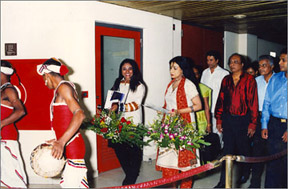
Bringing honour to the motherland at the Bandaranaike International
Airport with Tissa Abeysekara after receiving number of Awards at
the Dhaka International Film festival. |
|
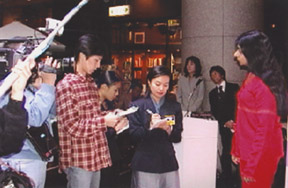
Addressing Japanese media |
The National Film Development Fund had been set up by D.B Nihalsinghe
and had been in limbo for some time until it was re-activated by Tissa
Abeysekara when he became the Chairman of the National Film Corporation.
It was the Fund which helped to birth several artistic films
including Dharmasiri Bandaranaike's 'Thunveni Yamaya' and Wasantha
Obeysekara's 'Palangetiyo'.
The article further stated that the fund intended to produce new film
makers to Sri Lankan cinema. She was reminiscent with gratitude to Tissa
Abeysekara for re-activating the fund as she is the only woman film
maker produced by the project.
Thus, was born 'Sulang Kirille' (The wind Bird) making Enokaa a film
maker. Though the film was based on a true story, Enokaa did not intend
to stick to conventional structure of sequential story telling; instead
she evolved her own structure to bring to light the lives of the workers
at the Free Trade Zone.
'Sulang Kirille' (The wind Bird) was not only a turning point in
Enokaa's career but it had also shed light on myriad myopic bureaucrats
in general and understanding of the animal in particular.
So much so that she recollects with a sense of mockery that she
learnt more of 'human being' from 'Sulang Kirille' (The wind Bird) than
the medium.
Ivan Weerakkody, then officer in charge of sanctioning Sri Lankan
films for International Film festivals, had blatantly refused to
sanction the film stating that it should not be fit to shown at any
international film festival and it is not up to standard.
She had to spend her hard saved deposit of 1.5 million rupees on 'Sulang
Kirille' to represent it at International Film Festivals and to
publicize the film.
However, the irony of the entire sordid affair was that the film
which Ivan Weerakkody denounced as one which should not be shown at an
international film festivals, had, so far, won the highest number of
awards at International Film Festivals in the history of 60 years of Sri
Lankan cinema.
In a parliamentary debate, the issue was raised by the Ministers T.
B. Ekanayaka and Mahindananda Aluthgamage which was recorded in the
hanzard. Following 'Rekhawa', 'Sulang Kirille' was the Sri Lankan debut
film to enter the main competition at an A grade International Film
Festival when it was shown at the Tokyo International Film Festival.
So far after Dr. Lester James Peries's and Dharmasena Pathiraja's
films, Ashoka Handagama's 'Aksharaya', Prasanna Vithanage's 'Iramadiyama'
and Prasanna Jayakody's 'Sankara' had been selected for main
competitions at A grade International Film Festivals. Vimukthi
Jayasundara's 'Sulanga Enu Pinisa' had also competed in the director's
first film section at Cannes.
One of the memorable experiences that Enokaa had in Japan was the
overwhelming response she had from Japanese audience for the film and
the exclusive interviews on the NHK television and the documentary on
the film aired by Fuji Television channel.
Though 'Sulang Kirilli' was not offered an award at the festival, the
films in the main competition such as 'City of Gods' by Fernando Millers
which was nominated as the best director at Oscars.
Though 'Sulang Kirille' was on par with other films exhibited at the
festival in terms of sound effect owing to technical constrains, the
film was judged on the basis of its originality and genuineness of
creativity. 'Sulang Kirille' was selected for the main competition at 22
International Film Festivals though she could not participate in most of
them personally due to economic hardships as she was not offered a
sponsorship by the National Film Corporation.
The criteria adapted by the International audience in evaluating a
film is the contribution it makes to world cinema. For them, what
matters is not the sexuality of the director, whether the movie promotes
the so-called culture or whether it was directed by a male or a female
and the way in which sex scenes were depicted but the artistic quality
of the film and genuine attempt made by the movie maker depicting life
in an authentic manner and in that socio-cultural milieu.
From the youth to the old men in Japan reacted positively to the film
questioning the minute symbols of the film whereas in Sri Lanka, the
very persons engaged in movie making considered the film as complex
structure.
However, when it was shown to women workers in the Free Trade Zone,
they had no difficulty in reading the film.
A symbol is something which should not be implanted in a film but
should be merged well into the structure so as to give a third dimension
to the storyline. Her symbolic language she used in the film, though
hailed as a complex diction by International audience had been
maliciously criticized by some of the representatives of the Sri Lankan
film industry Sri Lankan. The film won 24 National awards including
those for best Director and Script-writer.
Sulang Kirilli deals with the issue of illegal abortion in its most
appropriate context; among the unwed women workers in the Free Trade
Zone. It was based on a true incident of abandoning a child in a factory
toilet. Enokaa does not approve the way in which unwed mothers and
illegitimate children are treated in Sri Lankan society.
'It is estimated that between 1,000 to 2000 illegal abortions take
place every day in Sri Lanka, when I was doing a documentary for the
Government (National Women's Bureau) on the garment factory workers,'
said Enokaa.
The story revolves around Rathie (played by award winning actress
Dhamitha Abeyratne) and her soldier friend Shantha played by Linton
Semage.
The movie shows how the Rathie's dream world was shattered with the
revelation that Shantha is already married when she told of her
conception, dreaming of motherhood and happy wedded life. The scenes
unfold in a non-linear sequence as it happened in reality.
Speaking on the existing film culture in Sri Lanka where a film, a
piece of art is measured in terms of the reading of its movie maker,
his/her sexuality and image projected on the society or the political
affiliations rather than the pros and cons of the work of art. This has
a debilitating effect on the film-makers.
The work of art is not read on its relative merits of depiction and
contextual relevance but on political and social stand of its creator,
his/her personal life and outlook on the society. The criticism would be
venomous and virulent if the ideology of the creator goes against the
popular culture and dominant social discourse of the day.
However, she does not believe in the concept that majority of the Sri
Lankan audience is immature. The film had been shown to diverse audience
and they had also demonstrated a remarkable degree of understanding of
the film with its imagery and complex structure.
They have interpreted some aspects of the film in a hitherto unknown
perspective on the story. A certain section in favour of popular culture
tries their best to portray the work of art which explores and
experiments the media with controversial themes, as something which is
difficult for the Sri Lankan audience to understand and created with the
aim of securing awards at International Film festivals.
This idea is being spread with the parochial aim of destroying the
value based works of art which this section deemed as a possible threat
to their survival in the medium. The sub-culture dominated by
gangsterism, favouritism has effectively closed the doors for a
constructive discourse among the film makers which would otherwise be
immensely educative.
Enokaa is of the opinion that contemporary Sri Lankan Artistic cinema
is always more or less a resultant of individual struggle of film-makers
despite the caustic attacks from the popular cinema which categorized
artistic films as those aimed at securing awards at International Awards
or tailor-made for International audiences on themes turned out from
social scourges.
Contemporary cinema is a reflection of culture, the general
understanding of the population and the values of society. However, the
Sri Lankan perception is that films should be made to attract more
audience to theatres in order to salvage film industry.
It has been totally neglected that a space should be there in the
Industry for contemporary artistic film makers who tried to experiment
with the medium and to broaden its traditional vistas even outside
mainstream cinema.
However, the tragedy in contemporary Sri Lankan cinema is that a
handful of artistes with the blessings of the political powers that he
claimed the ownership of the medium, reading and interpreting it to meet
their ends.
Then the so-called interpreters decide on the mainstream discourse of
the country and attempting to crucifix value-based works of art which
are not in line with the dominant interpretation and their creators
labelling them as anti-cultural and unpatriotic.
[email protected]
****
Internationally acclaimed film maker
'The three key names of modern cinema; Theo Angelopoulos, Abbas
Kiarostami and Aleksander Sokurov had a great platform throughout our
festival. At 21st Cinematica one of the very young realist; Enokaa
Sathyangani from Sri Lanka who had obtained recognition in Asian
festivals, had to be gotten up to the above list.
In her talented premium Sulang Kirilli (The Wind Bird); reveals the
oppression of a woman as poetic fantasy liberation.'
XXI International film festival of Cinematica del Uruguay in Latin
America (Official Announcement/The revelation of the year 2003) Very
realistic and heartwrenching Seattle's Independent South Asian Film
Festival - USA - September 2005 HHHH "The realistic nature and
frightening loneliness of going through the 9 months of child-bearing
with the unwed mother surprisingly hit me hard inspite of growing up in
a similar society in India.
The director did a great job of showing us the sadness, happiness and
selflessness of the human spirit in the face of extreme adversity."
Reviewer: Chetna Bail/USA
Visually Stunning - Creatively Brilliant
Best Cinematography Award (Feature Film)/New York International
Independent Film Festival 2005.
For its human and sensitive treatment of the humdrum of our existence
that s at once specific and universal in its appeal.
Adoor Gopalakrishnan - Veteran Filmmaker/India
It is a Great Movie
Shigren Okada - Chairman Tokyo International Film Festival 2002
"For the Humanism created beyond Cultural and Political boundaries
portrait in Cinematography"
Honourable jury mention/Prix Leonardo International Film
Festival/Italy
Sri Lanka's film industry is tiny, a far cry from the
blockbuster-producing giants in Bollywood and Mollywood across the Palk
Strait.
But it bristles with talent. Many of its productions have been world
class, though few have got across to the world outside. Enokaa
Sathyangani is the latest torchbearer of a fairly long tradition in
Sinhala cinema fathered by Lester James Peiris. Enokaa's narrative is
taut and riveting, with each frame and piece of dialogue intricately
crafted.
She had drawn every frame of the film and taken great care to see
that the sets were authentic and that the lighting brought out the mood
of the scene.
P. K. Balachandran/HindustanTimes/India/january 2005
Sri Lankan cinema is highly acclaimed abroad - its films have won
dozens of awards at international festivals. Enokaa Sathyangani's latest
film the Wind Bird, broaches the taboo subject of abortion. It has
scooped awards at half a dozen International film festivals.
Chole Arnold/BBC - correspondent/UK-October, 2004
This is a poignant film, which uses symbolism but doesn't overdo it.
The movie does not invest in glamour. It tells its tale by extraordinary
good portrayal of the ordinary. Yet if I were asked to pick one word
that best describes the movie, I would pick "sensuous".
Rajpal Abeynayake - Sunday Times/October 6, 2002 |
